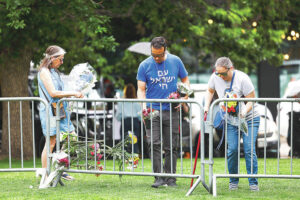News in brief for June 4
Chinese accused of smuggling ‘agroterrorism weapon’ into US
WASHINGTON (Reuters) — U.S. federal prosecutors have accused two Chinese nationals of smuggling a dangerous biological pathogen that had the potential to be used as an agricultural terrorism weapon into the United States for research.
ADVERTISING
The U.S. Department of Justice on Tuesday identified the pathogen as Fusarium graminearum, a fungus it said was classified in scientific literature as a potential agroterrorism weapon. In a statement it said that the fungus causes “head blight” in some crops and is responsible for billions of dollars in economic losses globally each year.
According to an FBI criminal complaint, Zunyong Liu, 34, a researcher currently in China, brought the fungus into the United States while visiting his girlfriend, Yunqing Jian, 33, in July 2024.
He admitted to smuggling in the fungus so he could conduct research on it at a University of Michigan laboratory where his girlfriend worked, according to the complaint.
The university did not immediately respond to a request for comment.
According to the complaint, an examination of electronic communications between the two indicated that they discussed shipping biological materials and research being done in the laboratory prior to Liu’s arrival.
Jian and Liu were accused in the complaint of conspiracy, smuggling goods into the United States, false statements and visa fraud.
Cheyvoryea Gibson, special agent in charge of the FBI Detroit Field Office, said the pair’s actions “posed an imminent threat to public safety.”
Jian was expected to appear in court in Detroit, Michigan, on Tuesday. A judge appointed a public defender, who could not be immediately reached for comment, to represent Jian.
Kennedy Center ticket sales fall sharply after Trump takeover
(NYT) — Ticket sales and subscription revenue at the John F. Kennedy Center for the Performing Arts have fallen sharply since President Donald Trump made himself chair in February, according to data compiled by employees that was obtained by The New York Times.
Single-ticket sales were down roughly 50% in April and May, compared with the same period in 2024, according to the data. Subscriptions, traditionally an important source of revenue, have also declined significantly this season: Revenue was down 82% for theater and 57% for dance.
At the National Symphony Orchestra, one of the Kennedy Center’s flagship ensembles, subscriptions declined by 28%, the data showed. At Washington National Opera, subscriptions were down 25%. In total, subscription revenue was projected at $2.7 million in the coming fiscal year, compared with $4.4 million this year.
The numbers were confirmed by a Kennedy Center employee, who was granted anonymity because the information was considered confidential.
Trump stunned the cultural and political worlds when he made himself chair of the Kennedy Center, vowing to make the institution “hot” again and purging its previously bipartisan board of appointees by President Joe Biden. He ousted the longtime chair — financier David Rubenstein, who was the center’s largest donor — and stacked the board with his own aides and allies. Deborah Rutter, the center’s president for more than a decade, was fired and replaced with a Trump loyalist, Richard Grenell.




